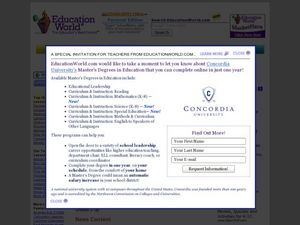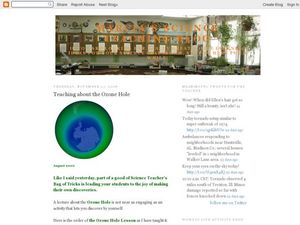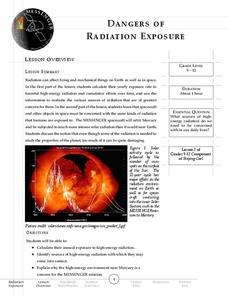Curated OER
The Right Ratio of Rest: Proportional Reasoning
Students see how NASA scientists are studying the circadian timing system to improve astronaut's physical and mental tasks while working in space. They demonstrate how fractions, decimals, and percents are related.
Curated OER
Cloudy vs. Clear
Students analyze line plots. In this weather lesson using real NASA data, students discuss how weather affects the way the Earth is heated by comparing different line plots.
Curated OER
NASA, Impact on Space
Students examine the work of NASA. In this space exploration lesson, students watch "1958: Project Mercury Begins." Students then view a PowerPoint presentation about the history of NASA and research each of the manned space programs.
Curated OER
NASA Robots
Students explore the world of robotics. For this robotics lesson, students discover what a robot is and work with partners to find out how hard it is to accurately guide robots through simple tasks.
Curated OER
Teacher-Astronaut Offers New Lessons
Learners read about teacher-in-space Barbara Morgan and life in space. In this space science and current event lesson, the teacher introduces the article with a vocabulary activity, then students read the news piece and participate in a...
NASA
Heavy Lifting
Accept NASA's challenge to design heavy lifting vehicles. Groups of three design balloon-powered rockets to carry as much payload to the ceiling as possible. The teams are encouraged to launch several times while making improvements to...
Curated OER
Teaching About the Ozone Hole
A PowerPoint and an accompanying worksheet introduce young meteorologists to the hole in the ozone layer. Another handout provides a coloring and graphing activity which examines the changes in the ozone. There are also links to neat...
Chicago Botanic Garden
Greenhouse Gas Emissions – Natural and Human Causes
Part three in the series of seven has pupils discussing the different greenhouses gases, learning about the carbon cycle, and then watching a short video about the carbon cycle. Based on their knowledge, individuals complete a greenhouse...
Chicago Botanic Garden
What Can Tree Rings Tell Us About Climate?
Tree rings are slightly thicker on the south side of the tree because it receives more sunlight. Part two in a series of five lessons helps learners analyze tree rings to determine the environmental conditions that caused size...
Chicago Botanic Garden
Are You Bigfoot?
Scholars independently explore several websites to calculate their ecological footprint. Using their new found knowledge, they answer six short-answer questions and take part in a grand conversation with their peers about how our...
NASA
Exploring the Moon
Can plants grow on the moon? The second instructional activity in a five-part series has pupils explore the resources available on the moon to determine if plant life is possible. They use lava rocks as their soil and draw conclusions...
EngageNY
Interpreting the Graph of a Function
Groups sort through NASA data provided in a graphic to create a graph using uniform units and intervals. Individuals then make connections to the increasing, decreasing, and constant intervals of the graph and relate these connections...
Teach Engineering
Alloy the Way to Mars
Future engineers test different alloys to determine the specific strength of each one. Based on the results, they make a recommendation to NASA on which alloy to use on engines for spacecraft.
Teach Engineering
Come On Over Rover
Introduce your class to the steps that occur in the manufacturing of parts, the assembly, and the testing of a Mars rover. Pupils learn about fabrication techniques and tolerances in the manufacturing process.
Curated OER
Team Moon
Students read "Team Moon: How 400,000 People Landed Apollo 11 on the Moon," by Catherine Thimmesh. They watch portions of the movie "Apollo 13." Students use the internet and the attached study guide to discover specific information...
BioEd Online
Good Stress for Your Body
Stress the importance of the different types of pressure our mind and body experience in a lesson about how certain types of stress are actually necessary and good for our bodies. As astronauts and people with injuries can attest, not...
BioEd Online
Skeletal Structures
What better way to study the structures of organisms than by creating a new being? After considering different types of skeletal supports (exoskeleton and endoskeleton), budding biogeneticists work together to create their own animals -...
American Institute of Physics
When Computers Wore Skirts: Katherine Johnson, Christine Darden, and the “West Computers”
Did you know that people, known as computers, performed the complex calculations that are now done by electronic computers? Three of these human computers, Katherine Johnson, Christine Darden, and Melba Roy Mouton are featured in a...
Teach Engineering
The Amazing Aerogel
Introducing ... the aerogel. The first of a two-installment series teaches young engineers about the properties and uses of aerogels. A PowerPoint presentation provides information about this unique material to help solidify the concept.
Messenger Education
Dangers of Radiation Exposure
Gamma radiation, which is harmful, is useful in treating cancers. In the second lesson in a series of four, young scientists take surveys and calculate their yearly exposure to ionizing radiation. Then they read about how harmful their...
Baylor College
Your Energy Needs (BMR)
How many Calories one needs on a daily basis is dependent on a number of factors including gender, height, and activity level. In the third of seven lessons about energy and food, young nutritionists calculate the number of Calories...
PBS
Data Plots of Exoplanet Orbital Properties
Scientists discovered the first exoplanet in 1995 and by early 2018, they confirmed the existence of more than 3,700—that's a lot of data! As part of the PBS 9-12 Space series, scholars interpret data about exoplanets. They compare...
Curated OER
The Lesson: Space Exploration
Learners explore space. In this current events lesson, students visit selected websites to learn about NASA, Mars, the Seti Institute, and space exploration terminology. Learners make space glossaries and their own telescopes.
Curated OER
Settlement Exploration: Then and Now
NASA has crafted an imaginative and memorable series of lessons, "NASA and Jamestown Education Module." This instructional activity is one of the five components. In it, middle schoolers connect history and science by comparing the...

























